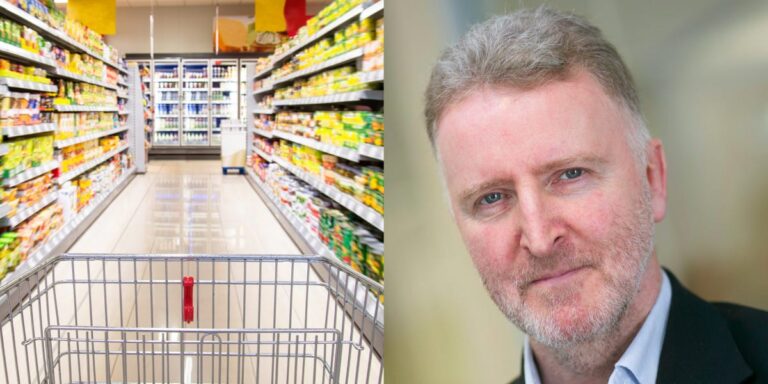- UPF is common in the Western diet and is associated with serious health problems, including diabetes.
- Food companies are using sensory scientists to make ultra-processed foods appealing.
- Sensory expert Professor Barry Smith cut out UPF to lose weight effortlessly.
The professor, who previously worked in the production of ultra-processed foods for a multinational food company, learned about the health risks of processed foods, eliminated them from his diet, and lost weight without any effort.
Professor Barry Smith, director of the Institute of Philosophy at University College London, who previously worked for Kellogg’s, Coca-Cola and Ferrero, told Business Insider that UPF made up about 30-40% of his diet.
Made with ingredients and processes not typically found in kitchens, UPF is a key feature of the Western diet: It makes up 73% of the U.S. food supply, according to a non-peer-reviewed research paper published in 2024 by Northeastern University’s Network Science Institute.
These super tasty foods have the perfect ratio of fat to carbohydrates, making them nearly impossible to stop eating, Smith says.
“These are foods that our bodies crave, and they actually slow down our satiety mechanisms,” he said.A study published in the journal Nature Food in 2023 found that the more highly palatable foods a meal contained, the more likely participants were to eat more calories overall.
Smith began cutting back on his use of UPF around 2020 after Dr. Chris Van Tulleken, author of the best-selling book “Ultra Processed People,” which revealed the harms of industrial food processing, asked him about it on a podcast.
“They wanted to know from me what are the sensory tricks and hacks in food production and food formatting that make us consume and desire and crave these foods,” Smith said.
This has made him more aware of health concerns (a study published in the BMJ in February showed that UPF is associated with an increased risk of 32 health problems, including type 2 diabetes, depression and cardiovascular disease) and has got him thinking about his work.
“I realized that I may have unwittingly been supporting this trend in the food industry and I couldn’t do it with any conscience,” he said.
Smith said food companies hire sensory scientists and chemists to make ultra-processed foods appealing, but they tend not to eat the products they make.
“They know what the design, the format, the industrial process looks like, so they don’t necessarily want to eat it themselves,” he said.
Smith no longer works with UPF companies (though he says he has never advised them on how to make the foods people can’t stop eating).
He shared three things that helped him change his eating habits:
First, take a break from UPF (so you might not want to go back to it).
The more Smith learned about the health risks of UPF, the less she wanted to eat it, so she decided to stop eating it altogether.
He found he didn’t like the physiological effect they had on him, and over time he actively grew to dislike them.
“They seem too intense, too flavorful, too loud in some ways,” he said.
“I was consciously trying to avoid ultra-processed foods because I felt they might be bad for my health, and I found the benefits to be very desirable,” he said.
He had more energy, felt fuller for longer, was able to stop eating when he was full, and lost weight effortlessly.
He believes this is because he was obsessed with UPF before, rather than actually enjoying it, and that it was only after he stepped away from it that he was able to see what UPF was really like.
“When we suppress those cravings, we rely on our natural portion control to not overeat,” Smith says. “These foods aren’t necessarily our favorites over anything else, but they’re foods we crave and can’t help but crave.”
While this worked for Smith, quitting suddenly isn’t for everyone: As registered dietitian Linia Patel previously told BI about cutting back on UPF, creating any new habit requires a behavioral change, so it’s best to experiment and find what works for you.
Check food labels
Smith said checking nutrition labels on foods can help people choose products that are minimally processed.
He finds that even seemingly “perfectly fine” foods like canned kidney beans from the grocery store can contain gelling agents and stabilizers, an issue he avoids by choosing organic.
Unfortunately, this highlights how healthy eating habits may be influenced by an individual’s food environment and socioeconomic status.
Finding Really Tasty Alternatives
As a professor of the senses, Smith is interested in the multisensory experience of taste: “The sight of something, the smell, the feel of it under your fingers, even the sound of food when you crackle something or shake something. All of these are part of the experience of tasting and eating,” he says.
He said this is important to consider when moving away from UPF, which is manufactured to taste good.
“You can’t convince people to avoid ultra-processed foods by telling them they’re bad for you – taste is key,” he said.
Vegetables, while nutritious, can easily become quite boring, but there are lots of ways to make them interesting, he says, whether that be roasting, pickling or fermenting.
“I have to make it really good so people know I can make something that’s actually enjoyable to eat, reasonably cheap, and reasonably well,” he said.

